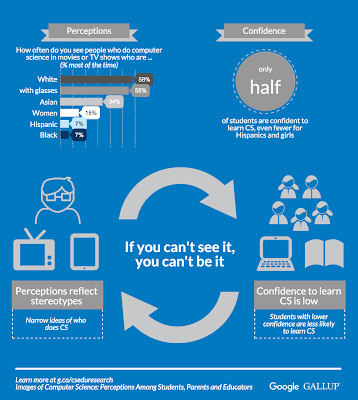Editor's note: Ensuring the appropriateness, value, and impact of our efforts in the computer science education space first requires an understanding of the issues which broadly impact the discipline, its practitioners and its students. This article is part of our ongoing effort to explore those issues and share our learnings along the way.
Technology is undeniably becoming an integral part of our lives, shaping virtually everything around us. Unfortunately the computer science (CS) behind all of the technology we love isn’t so widely understood. Compounding the issue is the fact that groups like women, Blacks, and Hispanics are underrepresented in CS education and in the high tech workplace. This underrepresentation has been growing for decades and because of it, we simply don’t have enough students--especially those with diverse backgrounds--studying CS to even fill the projected number of computing jobs that will be available in five years (NCWIT). In order to change that trajectory, we need to better understand the current landscape and the factors that led us to this point.
That’s exactly why today, in partnership with Gallup, we’re releasing our second report from an ongoing series of studies on the state of U.S. K-12 CS education: Images of Computer Science: Perceptions Among Students, Parents and Educators in the U.S.
This report explores participation in and perceptions of CS learning by gender, race and income. We surveyed nearly 16,000 respondents, representing students, parents, teachers, principals and superintendents. From our first report, Searching for Computer Science: Access and Barriers in U.S. K-12 Education, we learned about the differences in exposure and access to CS learning and computers between Black, Hispanic and White students. The findings from today’s report show that we have more work to do beyond just providing access.
The results show that there’s high value and interest in CS among all demographics, and even more so for lower-income parents. But unfortunately perceptions of who CS is for and who is portrayed in CS are narrow--White, male, smart with glasses. Even though they value it, students often don't see themselves in it. Students who are female or Hispanic, and lower-income students all report lower confidence to learn CS. Our hope is that these findings will inform strategies that encourage more diverse students to pursue CS and increase access to CS learning opportunities for all students.
Here’s a summary of our findings:
Parents and teachers of lower-income students view CS as critical to a student’s future, yet lower-income students are less likely to have access to CS learning in school:
- 76% of parents in lower-income groups believe CS should be required in school.
- These parents are also more likely to value CS over other required courses.
- Teachers in schools with a larger percentage of students eligible for a free or reduced lunch are more likely than other teachers to think CS learning opportunities are more important to a student’s future success than other elective courses.
Image about CS is positive, but confidence to learn it is low:
- More than 90% of students & parents have a positive image of CS jobs and more than 80% of all populations studied believe CS is used in many jobs.
- Yet only half of students are confident to learn CS, and the percentage is even lower for Hispanics and girls.
- We found that students who are more confident in their ability to learn CS are also more likely to say they will learn it in the future.
Perceptions reflect stereotypes:
- Given the high value of CS among all populations studied, it’s disappointing to learn that many have narrow perceptions of who practices CS.
- Students and parents perceive few portrayals of female, Hispanic or Black computer scientists on TV or in movies.
- These groups are much more likely to see White or Asian men engaged in computer science.
- About half of students and 57% of parents agree that “People who do computer science need to be very smart”.
Computer science is misunderstood:
- We see that CS is becoming recognized as important, but there is still confusion of how it is different from general technology skills.
- Over half of students, parents, teachers and principals do not properly distinguish between computer science activities (e.g., programming and coding; creating new software), and general computer literacy (e.g., creating documents; searching the internet).
- This is more pronounced among female, Black and Hispanic students and parents.
These findings highlight the need to create learning environments that work for all students. Increasing awareness about what CS is will require efforts to help students, parents and educators alike fully understand the critical principles of CS in order to fulfill students’ potential rather than limiting them to basic low-level skills. Also, we need to do more to ensure that all students are able to see themselves in CS careers - we’ve got to help them see it, to be it. This will require continued efforts to leverage media outlets to help dispel stereotypes and showcase positive portrayals of diversity in computing.
Uplifting CS education opportunities for all students will require effecting change to the entire ecosystem. A comprehensive set of recommendations from our findings can be found here.
To find out more about Google’s CS learning opportunities and research, visit g.co/csedu.
